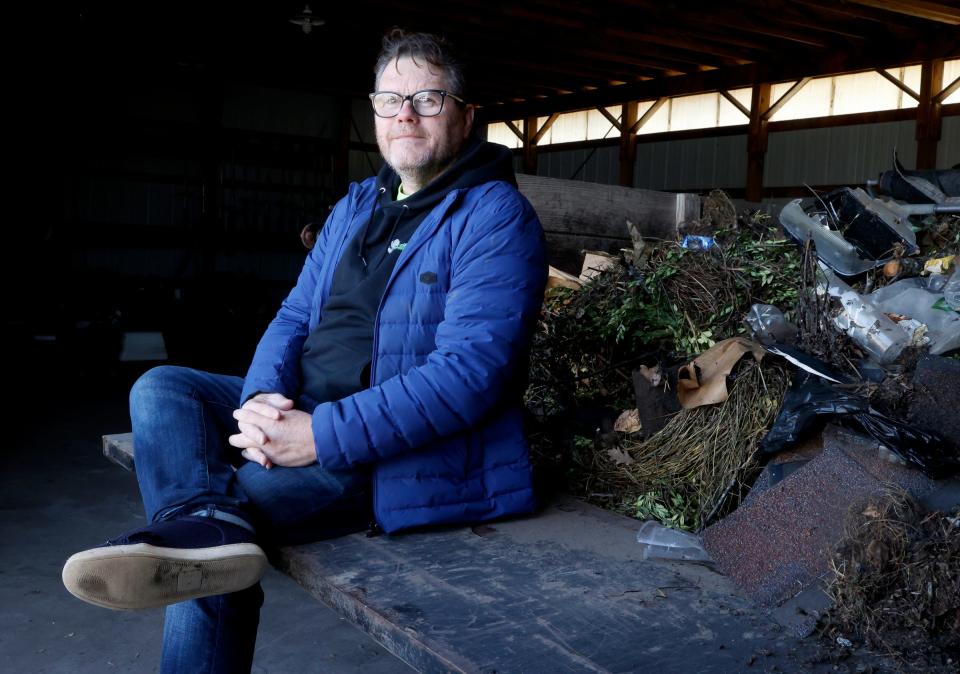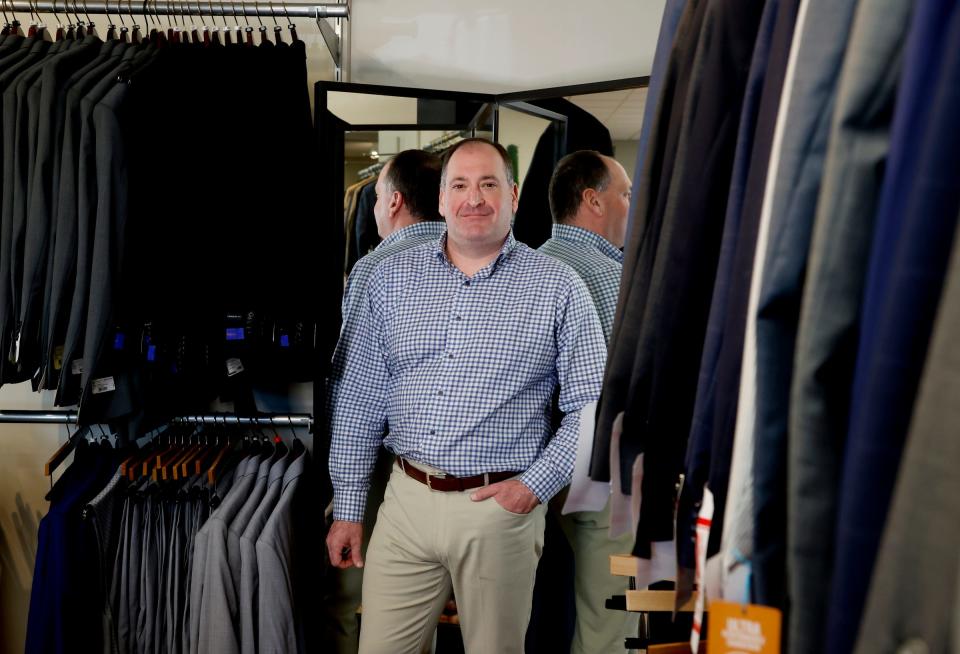As Trump visits, Michigan bellwether Saginaw County is feeling its political juice

SAGINAW — The year 1900 may have marked the apex for Saginaw County’s political power in Michigan.
A Saginaw man, Aaron T. Bliss, got elected to the governor’s office, and the sprawling 8th Congressional District was more than 20 years into a 74-year run during which it sent both Republicans and Democrats to Washington, D.C. — provided they came from Saginaw County.
As former President Donald Trump arrived in the county on Wednesday for the third visit by a presidential candidate in four years, Saginaw, a county of 190,000, is again feeling its political juice. The county has earned outsized attention as an election bellwether. Every four years since 1992, the presidential candidate who won the county has also swept Michigan's electoral votes by winning the entire state.
Just as Saginaw's influence constitutes a throwback, two issues Bliss and other politicos fought over at the dawn of the 20th century — immigration and protective tariffs on foreign goods — are again center stage.
President Joe Biden visited in March, landing aboard Air Force One at the same Freeland airport where Trump campaigned in September 2020 and where Trump held another Saginaw County rally Wednesday night.

County voters, who backed Trump in 2016 and Biden in 2020, are split.
“I am going to, of course, vote for former President Trump,” said Thomas Roy, who runs a Saginaw-area landscaping company and is unhappy about inflation, Biden’s moves to forgive billions of dollars in student loan debt and government spending in general.
“We’re not headed in a good direction with President Biden giving everything away for free,” Roy said. “The leadership … needs to stop the foolish spending.”

Alma Medina, of Saginaw, a retired AT&T switchboard operator who also served as a union official, said much of the criticism directed at Biden doesn’t withstand sharp scrutiny.
“Trump was in office, and he made all these big expenditures. And now it's catching up with us. So naturally, they blame Biden. They're not looking at what the previous administration did to make this happen,” Medina said.
The federal government spent $6.13 trillion in the 2024 fiscal year, according to the U.S. Treasury Department. Using inflation-adjusted dollars, that was up from $4.95 trillion in 2017, the first year of the Trump presidency. So Roy is correct that federal spending has increased under Biden. But federal spending peaked at $7.72 trillion in 2020, the final year Trump was president, records show. So Medina is also correct in what she said.
It's like that with many issues. On the economy, Democrats point to low unemployment and a booming stock market, while Republicans cite high inflation and a record deficit. Many Democrats see Trump as a want-to-be dictator who tried to overturn the 2020 election, which he knew he had lost. Many Republicans see Biden as a doddering career politician who allowed his son and other family members to make millions from foreign countries by cashing in on his name and connections.
County combines manufacturing, farming, tourism
If any one Michigan county is well-positioned for assessing where things stand in this election, it may be Saginaw.
Like Detroit in Wayne County, the city of Saginaw is a Rust Belt survivor showing signs of resurgence amid contaminated industrial sites, population loss, abandoned homes and crime. Manufacturing, including the auto industry, still employs thousands of people in Saginaw County, including about 400 at GM's Saginaw Metal Casting Operations. Beyond its biggest city, Saginaw County’s 299,000 acres of farmland ranks sixth-highest in the state. For retail, the Birch Run outlet mall rivals any in Oakland County. And in Frankenmuth, with its chicken dinners and celebration of all things Christmas, Saginaw County has a unique cultural and tourism attraction akin to The Henry Ford in Dearborn or the fudge and horse-drawn carriages of Mackinac Island.
Saginaw's leaders have been attempting to diversify the county's economy beyond the auto industry, toward medical services, energy and high-tech jobs, such as a recently announced $900 million solar component manufacturing facility that could bring 1,000 jobs. The Corning Inc. project, which has been approved for $80 million in funding from the state's Michigan Strategic Fund would be located in Richland Township, near where Hemlock Semiconductor already has a plant.
In 1900, the white pine forests around Saginaw that spurred the city's growth had been cleared to the stumps. But the city and county were getting a second wind, even importing raw timber to support various mills, a toothpick plant, and two piano factories, one of which also made harps. The county had sugar beet plants, a new plate glass factory, and salt wells. An infant Saginaw coal industry, which peaked in Michigan in 1907 but died out before 1950, was producing 5,000 tons a day, the Detroit Free Press reported at the time.
"It has been a godsend to Saginaw that the pine tree has made way for progress and wealth beyond anything heretofore experienced," the newspaper said. "Its place has been taken by other industries of far greater value to the city.”
Today, city leaders can only hope that Saginaw's transition away from the gasoline combustion engine can be equally successful.
In 2022, when Democratic Gov. Gretchen Whitmer outpolled GOP opponent Tudor Dixon by 8 percentage points among Saginaw County voters, on her way to an 11-point statewide victory and a second term, abortion rights were front of mind. The election came a little more than four months after the U.S. Supreme Court overturned Roe v. Wade.
This time, there's still some of that.
Austin Urlaub, a social work student at Saginaw Valley State University, said he will be a "one issue voter" when he casts a vote for Biden Nov. 5.
"I can't vote for someone who would take away women's rights," said Urlaub, who is president of the student association but said he was speaking personally, not on behalf of the group.
Though abortion will decide his vote, Urlaub said he senses less energy around the issue than he did in 2022, before Michigan enshrined reproductive rights in the state constitution and repealed a 1931 law that criminalized most abortions. "It's definitely receded," he said.
Old issues of immigration and tariffs resurface
Now, other issues are dominating. Some of them were front and center when Bliss was elected governor in 1900, just as they were when the Republican Civil War veteran and lumber baron was elected to represent Saginaw, Clinton, Shiawassee and Tuscola counties in Congress, 12 years earlier.
"The Republican Party of this district affirms its unshaken faith in the protection of American industries as against the world, and we will do all in our power to protect by just laws the protection of the working classes from the degrading competition of the pauper labor of the world," read a resolution passed by the GOP for the 8th Congressional District after nominating Bliss for Congress at a meeting in Saginaw in 1888.
Words like those would not be out of place in a Republican National Committee news release today.
Back then, Chinese laborers were seen as such a threat that the Chinese Exclusion Act of 1882 specifically barred their entry to the U.S. for decades. But immigrants from southern Europe, seen as less educated and less desirable than those from the north, were also a concern. A Lansing newspaper report from 1900 said 14 Italians were captured after entering the U.S. from Mexico and sent back to Juarez, demonstrating the number of border guards was not sufficient "to prevent pauper and contract immigrants ... from crossing the border and scattering into the interior."
Like today, many reports tied undocumented immigrants to violent crime. And like today, the data didn't bear that out. “One finds that the proportion of persons in prison is about 50% greater among the (U.S.) natives than among the foreign-born population," the Port Huron Times Herald reported in 1900.
In Saginaw County, the U.S.-Mexico border is about 1,500 miles away, but a huge issue in the presidential election, said Tracey Slodowski, who lives in the tiny village of Merrill and represents her rural district on the county board of commissioners. If she asked her constituents the first thing Trump should do once elected, "probably the first thing everybody's going to say is close the border," Slodowski said.
Crime and security is part of it, but there is no significant crime in Merrill, so there is more to it than that, said Slodowski, who supports Trump.
"These guys work their tails off — farming is hard work," Slodowski said. "They can't afford health insurance. They can't afford to send their kids to college. But yet, their taxes are going to fund other people to be able to do things for free," she said. "There just seems to be a lot of resentment that they feel their hard work is paying for the world's, you know, free college. Free this, free that, but yet, they don't see any of it for themselves."
Those feelings are not unique to Republicans.
"This country was made of immigration — people that came to the U.S. for a better life," said Medina, who is a strong Biden supporter. "However, I am concerned about the quantities. You know, I can't afford to pay to put someone up at the Ritz Carlton."
New York City has spent tens of millions of dollars to house migrants in hotels, including the four-star Row New York City hotel near Times Square.
In addition to calling for tighter border controls, the Republican Party of 1900 supported protective tariffs like those Trump wants to impose on Chinese autos and a wide range of other foreign products, on the basis that it would help domestic manufacturers and farmers, even while driving up prices for U.S. consumers.
Roy said he supports such measures, due to what he sees as unfair trade measures and artificially low wages in China and other countries. He said he laughed when the federal government issued stimulus checks early in the pandemic and U.S. residents spent much of what they received on flat-screen TVs, X-boxes, and other goods, many of which were manufactured in China.
Though Trump, who Roy supports, had his signature on $1,200 stimulus checks sent out in 2020, Roy said it would have been better for the federal government to help people with rent or utility payments than to finance "a brand new 55-inch Sanyo television."
On April 17, Biden called for major hikes to tariffs on some steel and aluminum products from China, while warning that a broader tariff regime "could badly hurt American consumers." Gene Sperling, a senior White House advisor, told Michigan Public Radio that the new Biden policy is intended to help manufacturing-dependent states such as Michigan.
With some voters, Biden has work to do
Biden's March 14 visit to Saginaw was criticized because he met with only a few dozen voters during two events at a private home and a public golf course and made no public remarks.
Polls show Biden is underperforming among Black voters. Divisions and tensions over the November vote surfaced when two Black women who are friends, Nyesha Clark-Young and Terrilyn Collins, visited the Marshall M. Fredericks Sculpture Museum at Saginaw Valley State University, on April 4.
Clark-Young, a photographer, artist, and teacher, said she senses a lack of support and energy for Biden among Black voters she knows, based in part on what she sees as a lack of change in fundamental power structures, despite decades of Black support for Democratic candidates.
"We have to get something out of this too — we have to benefit, too," said Clark-Young, who describes herself as an "artivist" — combing art and activism — and said she is fed up with inaction on issues such as reparations for slavery, which she said is still a taboo topic for discussion.
“I don’t think Black people are voting for Trump. I just don’t think we’re going to be voting for Biden.”

If that happens, "Black people are going to pay," said Collins, who designs and makes clothing, raised three children in Saginaw, and is a former student in Clark-Young's art class for seniors.
Certain elections amount to "a life and death choice," and "this is one of those times," Collins said.
Collins, 65, and Clark-Young, 49, agree on many issues, but they have different views on how much progress Black Americans have seen and the best way to ensure future progress. Collins said she doesn't hear the sentiments Clark-Young expresses from friends who are her own age, and believes their different outlooks are partly generational.
Clark-Young was stung by remarks Biden made on a radio program in 2020 — and later apologized for — when he said: "If you have a problem figuring out whether you're for me or Trump, then you ain’t Black." She supported Bernie Sanders in 2016 and said she has voted third-party before, but this year is leaning toward an active abstention vote, similar to what many Dearborn-area voters did during the presidential primary to protest the war in Gaza.
Andy Silk, who owns a Saginaw Township men's clothing store, said he's been a Democratic voter most of his life but this year expects to vote for Independent candidate Robert F. Kennedy, Jr., the son of the former Democratic attorney general who was assassinated during his 1968 presidential campaign.
Silk, 41, represents the third and likely final generation in his family to run Edward's Men's Shop, which was founded in the 1940s and at one time had five outlets around the state — two in Saginaw, two in Lansing, and one in Kalamazoo. Silk has no children but his siblings do. However, they've moved to other states for better opportunities. Silk sees the gradual shrinking of the family clothing business, in part, as emblematic of the decline of the middle class in Michigan and Saginaw County.
Silk said he likes Kennedy's integrity and he shares some of the candidate's concerns about the emergency use approvals the Food and Drug Administration gave mRNA vaccines to fight COVID-19.
"He's a very thoughtful individual," Silk said of Kennedy. "I like his thought process and how he addresses problems. And in light of new information, he can change his mind. He's not dug into a single position. I think that is really, really important these days, because things change." Silk added: "I think politics have become a little too tribal — and it's not good for the country."

Others, like Kheila Knight, owner of Kheila's Beauty Boutique in Birch Run, where she is a member of the village council, have not yet focused on the November election and remain undecided.
Knight noted that candidates must be at least 35 years old to run for president.
"I strongly believe that they need to really cap the age as they get older, to 65 or 70," she said.
Biden would be 82 at the start of a second term. Trump would be 78.
"I feel like they should be enjoying their grandchildren right now, not trying to run the world," she said.
Saginaw remains the geographic center of the 8th Congressional District, which this year features a critical race in determining control of Congress after the retirement of U.S. Rep. Dan Kildee, D-Flint Township, who is completing his sixth term.
The 8th has been redrawn repeatedly since the late 1800s and now includes all of Saginaw and Bay counties, most of Genesee, and parts of Midland and Tuscola counties. The most recent redistricting has made it again as competitive as it was in the days of Bliss. The Republican served only one term before he was defeated by Democrat Henry Youmans, a businessman and former East Saginaw mayor.
In fact, the Cook Partisan Voting Index, developed by Charlie Cook of the Cook Political Report, has ranked Michigan's new 8th District as the median district in the country, with 217 districts rated more Democratic and 217 rated more Republican.
Contact Paul Egan: 517-372-8660 or [email protected]. Follow him on X, @paulegan4.
This article is part of a collaboration between The Free Press, a Michigan State University course and the American Communities Project to tell the stories of voters, their experiences, and their political motivations in communities across Michigan leading up to the 2024 election. Connect with us at [email protected], and read our previous stories on Livingston County, Ingham County, Schoolcraft County, Osceola County, Wayne County and Kent County.
This article originally appeared on Detroit Free Press: As Trump visits Saginaw County, bellwether is politically competitive
